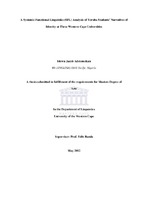| dc.description.abstract | There has been a great deal of research exploring Halliday’s (1978, 1994, 2004)Systemic Functional Linguistic (SFL) approach. However, there has been little work that specifically targets SFL to explore African discourse. Systemic Functional Linguistics (SFL) views language as “social semiotic”, that is, language is functional in terms of what it can do or what can be done with it; and semantic in that it is used to make meanings (Halliday’s, 1978). This study explores SFL to analyse narratives of identity as told by Yoruba students at three Western Cape Universities: University of the Western Cape (UWC), University of Cape Town (UCT) and University of Stellenbosch (SUN). This research is both quantitative and qualitative in outlook and results of the study are presented. I used the qualitative method to collect and analyse the data; but a certain amount of quantitative analysis was presented as well in order to determine the predominant identity options favoured by the students. A total of 14 Yoruba students were interviewed for data collection which was analysed with SFL interpersonal metafunction theoretical approach. Specifically, the study examines linguistic
choices that the students utilize to maintain and reconstruct their identities in Cape Town. This concentrates on the aspects of Mood component combining Subject and Finite element, Residual component comprising Predicator, Complement and Adjunct as well as Modality in participants’ narratives. Besides, an important aspect of the study was the consideration given to ethical issues. Analyses are presented on tables showing the frequencies of the interpersonal elements as configuration for preference use of different Subjects, Finites, Predicators, Complement and Adjuncts to either strengthen or weaken positions. Equally, the metaphorically expressions of objectivity to highlight the continuities and contradictions in the students’ narratives of identity in the diaspora was considered. These serve as interpersonal elements used by participants for stylizing and personalizing different identities options. Also, the study presents how the students organize their message for cohesion/coherence in their narratives. Thus, SFL establishes how the linguistic choices of the students reflect identity options in
their new environment. The study shows the strengths of systemic-functional approach in its integration of what the students said, with what they might mean within the situation in which they said them. Finally, I conclude that these elements of interpersonal metafunction framework make participants’ narratives coherent while revealing the different identities they appropriated in the diaspora. | en_US |

